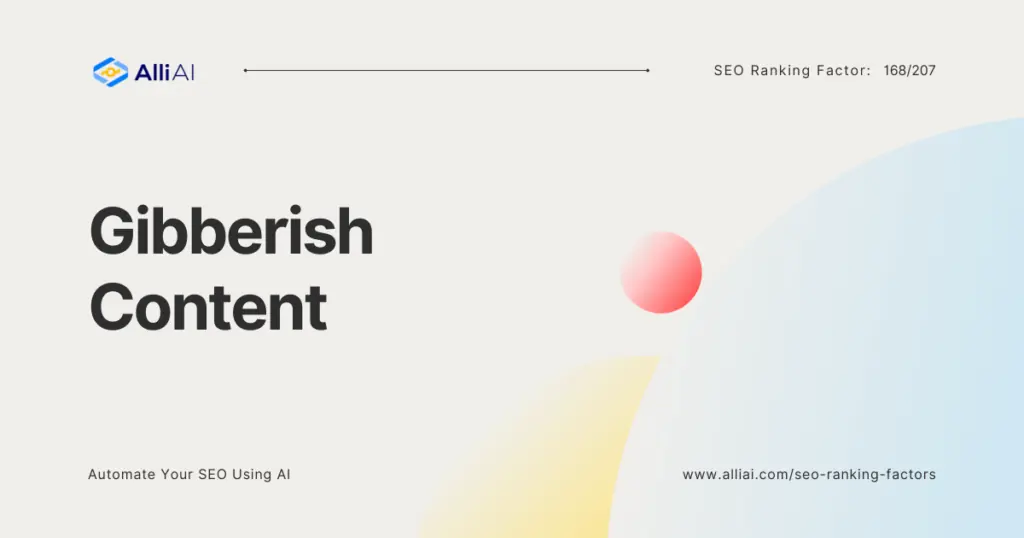Explanation of Gibberish Content
Imagine clicking on a promising search result, eager to learn about the latest tech gadget. Instead, you’re greeted with a wall of nonsensical text: “Gadget innovation tech revolution future now buy today.” Frustrated, you hit the back button, vowing never to return to that website.
This scenario is all too common, thanks to the scourge of gibberish content. While it might seem harmless, this type of low-quality, keyword-stuffed content is a silent killer for your website’s SEO. Let’s delve into why it’s so detrimental and how you can protect your website from its insidious effects.
Why is Gibberish Content Important in SEO?
Gibberish content isn’t just bad for user experience; it’s actively detrimental to your SEO efforts. Search engines like Google are not fooled by keyword-stuffed nonsense. They prioritize websites that provide valuable, relevant, and well-written content to their users.
Google’s algorithm updates, such as Panda and Hummingbird, specifically target low-quality content. Panda, launched in 2011, penalizes websites with thin, duplicate, or gibberish content. Hummingbird, introduced in 2013, focuses on understanding the intent behind search queries, making it even harder for gibberish content to rank well.
Moreover, gibberish content negatively impacts crucial user signals like bounce rate, time on page, and click-through rate. These signals tell search engines whether your content is engaging and relevant. If users quickly leave your site or don’t interact with your content, it signals that your website is not providing value, further hurting your SEO.
How Gibberish Content Affects SEO
Gibberish content’s negative impact is far-reaching and can cripple your website’s SEO in several ways:
Lower Rankings: Search engine algorithms are designed to demote pages that fail to provide value or a good user experience. Gibberish content falls squarely into this category, leading to lower rankings in search results.
Crawling and Indexing Issues: Search engines use crawlers (automated bots) to discover and index web pages. Gibberish content can confuse these crawlers, making it difficult for them to understand the purpose of your site and properly index your pages. This can result in your pages not appearing in search results or being ranked lower than they deserve.
Increased Bounce Rates: When visitors encounter gibberish content, they are likely to leave your site immediately, leading to high bounce rates. This sends a negative signal to search engines, further impacting your rankings.
Damaged Credibility: Websites with gibberish content lose trustworthiness among users and search engines. Users are less likely to engage with your brand if they perceive your content as low quality.
Long-Term Damage: Consistent use of gibberish content can have long-lasting negative effects on your website’s reputation with search engines. Even after removing the gibberish content, it can take significant time and effort to regain lost trust and improve your rankings.
How Can Alli AI Help with Gibberish Content?
At Alli AI, we understand the challenges of maintaining high-quality content across your website. Our AI-powered platform can help you:
- Identify and Eliminate Gibberish: Our sophisticated algorithms analyze your content for readability, coherence, and relevance. We pinpoint areas that may be considered gibberish by search engines, allowing you to quickly address and improve them.
- Optimize Keywords Naturally: We help you strike the right balance between incorporating relevant keywords and maintaining a natural writing style. This ensures your content is optimized for search engines without resorting to keyword stuffing.
- Quality Improvement Recommendations: Our platform goes beyond identifying problems. We provide actionable recommendations to enhance the overall quality of your content, making it more engaging, informative, and valuable to your audience.
FAQ
How does Google identify gibberish content?
Google’s algorithms are trained to recognize natural language patterns and can flag content that seems unnatural or irrelevant as gibberish.
Can gibberish content accidentally happen on reputable websites?
Yes, especially on large websites or forums where user-generated content is not closely moderated. It’s essential to regularly audit your content.
Is there a quick fix for gibberish content?
The best approach is a thorough review and revision of your content to ensure clarity, relevance, and value to your audience. Tools like Alli AI can significantly streamline this process.
Conclusion
In the quest for higher SEO rankings, the quality and coherence of your website’s content are paramount. Gibberish content not only hinders your SEO efforts but also your brand’s reputation and trust with your audience. By leveraging advanced tools like Alli AI, webmasters and content creators can ensure their content is engaging, valuable, and effectively optimized for search engines. Remember, in the world of SEO, quality content is king. Avoid the siren call of quick fixes like generating gibberish content. Instead, focus on building a solid foundation of relevant, high-quality content that resonates with your audience and search engines alike.






